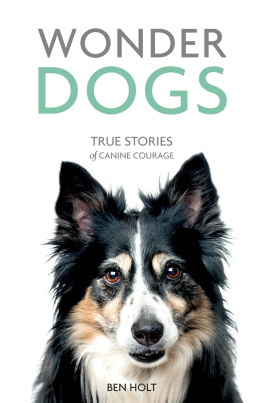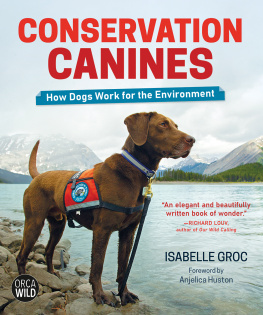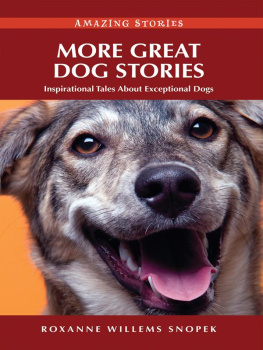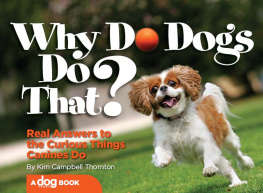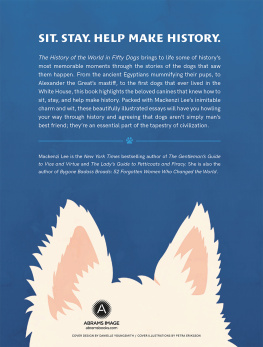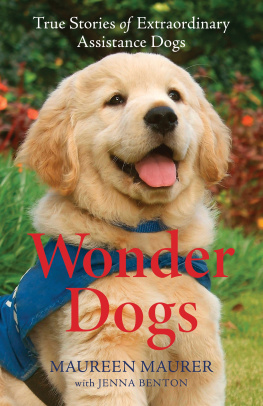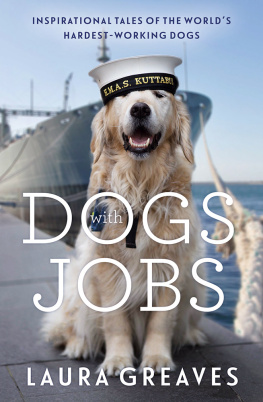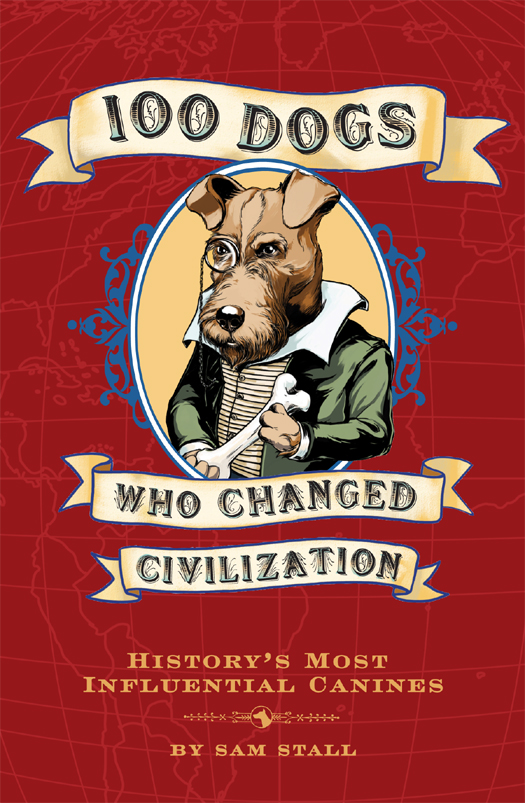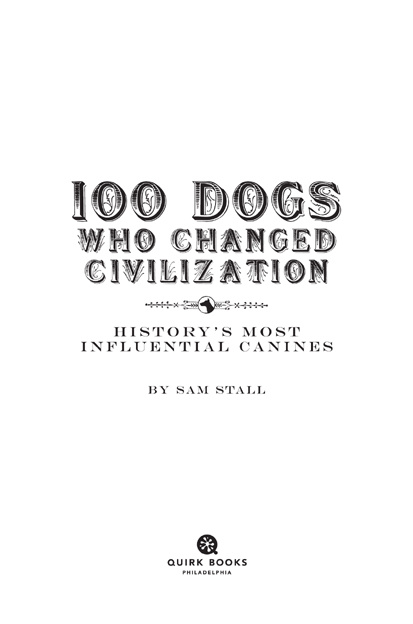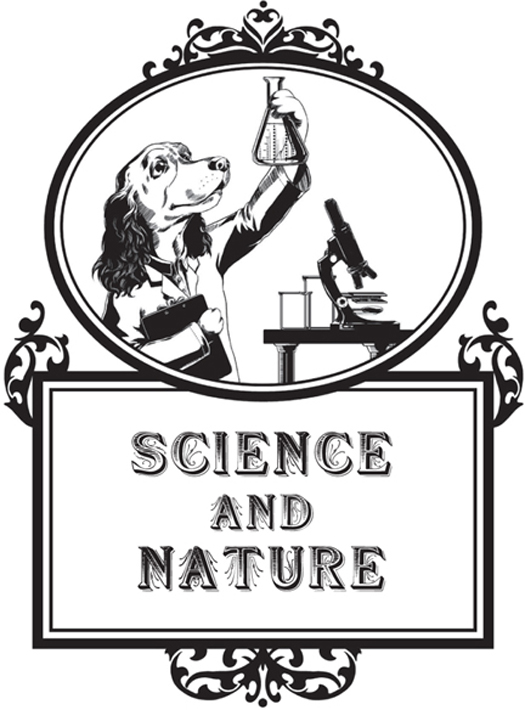Copyright 2007 by Quirk Productions, Inc.
All rights reserved. No part of this book may be reproduced in any form without written permission from the publisher.
Library of Congress Cataloging in Publication Number: 2007930607
eISBN: 978-1-59474-587-4
Designed by Bryn Ashburn
Illustrations by Zela Lobb
e-book production management by Melissa
Quirk Books
215 Church Street
Philadelphia, PA 19106
quirkbooks.com
v3.1
To Cortney the corgi, my greatest admirer.
The feeling was mutual.
CONTENTS
INTRODUCTION
Histories are more full of the examples of the fidelity of dogs than of friends.
Alexander Pope

Humanitys long, fruitful, extremely complex relationship with canines began strictly as a business deal. It probably went something like this: Tens of thousands of years ago, for reasons unknown, a pack of wolves joined forces with a group of cavemen. This intermingling created what modern business executives call synergy. The wolves possessed keen senses, speed, and strength. The humans possessed freakishly big brains and wielded deadly weapons.
Natures odd couple proved an unbeatable combination. But on the way to global dominance, something strange happened. The wolves turned into dogsdomesticated canines physically and emotionally tailored to meet specific human needs. We still hunted together, but we also herded, toiled, and even marched off to war side by side. And somewhere along the line, humans stopped seeing dogs as mere tools. They regarded them as colleagues, confidants, and friends. Even, dare we say, as mans best friend.
The feeling, apparently, is mutual. Of course theres no telling exactly how dogs regard us, because they cant speak for themselves. One can only judge them by their actions. Actions that, over the centuries, have included displays of devotion, courage, and selflessness that put the deeds of many human heroes to shameand made a book such as this not only possible, but plausible.
What have canines done? They have rescued some of us from eminent death. Theyve saved even more of us from boredom and loneliness. Their presence has been a stirring example on the battlefield and a comfort in the home.
The average dog performs acts of everyday heroism far from the spotlight, but some have become deservedly famous for their deeds. One can say without exaggeration that the fates of nations and empires have sometimes rested in capable canine paws. Alexander the Great lived long enough to earn his title only because his war dog, timely warning.
Other great canines left their marks in more unexpected but equally remarkable ways. Movies ranging from Casablanca to The Matrix might .
Dogs figure prominently in many of humanitys most remarkable political, cultural, and artistic endeavors, and their influence is almost always for the good. But that shouldnt surprise us, because almost every dog, whether he changes history or not, positively influences the harassed humans around him. In exchange for a pat on the head, we get unstinting devotion. In exchange for a bowl of food, we gain an unflinching ally. In exchange for a spot by the hearth, we get a lifetimes worth of love. Its been a profitable relationship for both of us. But humans definitely got the better part of the deal.
We know deep down that were unworthy of such a friend. But maybe, just maybe, dogs can inspire us to be more like the people they think we are.
SNUPPY
THE WORLDS FIRST
CLONED DOG

Dog fanciers like to think that every canine is unique. But that cant be said for Snuppy, the worlds first cloned dog.
Born on April 24, 2005, Snuppy was the product of years of work by scientists at South Koreas Seoul National University (SNU)the name Snuppy is a fusion of SNU and puppy. In order to produce this single clone, researchers transferred more than one thousand dog embryos into 123 female canines. This produced a paltry three pregnancies, only one of which proved successful. Snuppy, an Afghan hound created from an ear cell belonging to another hound named Tai, was carried to term by a yellow Labrador retriever.
One might wonder why they bothered. The scientists said it was because such clones could be used to study human diseases, or perhaps to produce human-compatible stem cells. The man in charge of the project, Hwang Woo-suk, was soon to be discredited by revelations that hed faked research on the cloning of human stem cells. But while Hwang fibbed about his work with humans, follow-up studies proved that his claims about Snuppy were all true.
LAIKA
THE FIRST EARTHLING IN SPACE

After more than half a century of space exploration, many people forget that the first creature to reach orbit was canine rather than human. The dog who opened the high frontier was a tiny stray from the streets of Moscow named Laika.
Her flight was a high-tech publicity stunt, designed to spotlight the Soviet Unions lead in rocketry. Soviet premier Nikita Khrushchev informed the Russian scientists responsible for the space-raceinaugurating Sputnik satellite that he wanted a new ship launched on November 7, 1957, to mark the fortieth anniversary of the communist revolution. Though the scientists werent yet ready to launch the new, more sophisticated vehicle theyd been developing, saying no wasnt an option. So they cobbled together another space ship in about a month. The rough-and-ready craft contained rudimentary life-support systems so it could carry a living organism into space, but time didnt permit the development of a heat shield and parachute system that would allow for that passengers safe return. Whoever rode the ship, designated Sputnik II, would make a one-way trip.
The unfortunate space pioneer was picked from a pack of Moscow street mutts rounded up and trained for experimental flights. Dogs were the selected species because the scientists believed they possessed the intelligence and discipline to cope with space travel, along with the ability to handle long periods in confined spaces. The first flight was awarded to a female husky mix who weighed about thirteen pounds (6 kg)perfect for the satellites cramped quarters. At first called Kudryavka (Little Curly), her name was later changed to Laika (Barker) when her original moniker proved too tricky for members of the international media to spell or pronounce. In America, she came to be known as Muttnik.


